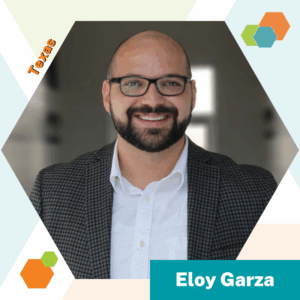Meet work-based learning (WBL) innovator Eloy Garza, lecturer in marketing at the University of Texas Rio Grande Valley Robert C. Vackar College of Business and Entrepreneurship, and a Fellow in the third cohort of the Postsecondary State CTE Leaders Fellowship at Advance CTE – Sponsored by ECMC Foundation.
Seeing that traditional approaches were not engaging my learners, I reimagined the course by turning my learners into marketing consultants.
 Q: Let’s start with your journey into CTE. How did your background shape your path into this field?
Q: Let’s start with your journey into CTE. How did your background shape your path into this field?
A: My path into Career Technical Education (CTE) began with a corporate career in sales and marketing, where I served as head of marketing and account executive for a company that works with major Original Equipment Manufacturers. That experience gave me a front-row seat to how businesses operate and succeed, and it showed me what skills learners would need to thrive in the real world.
When I became an educator, I was given the chance to launch a new high school marketing program. Seeing that traditional approaches were not engaging my learners, I reimagined the course by turning my learners into marketing consultants. I applied the same business development strategies I had used in industry, which became the foundation of my Learner-Led Agency model.
Q: Access to high-quality work-based learning is a common issue for many states and institutions across the nation. How do you address this challenge at your institution and in Texas?
A: I learned early on that expanding access to high-quality work-based learning (WBL) is one of the biggest challenges. Too often, WBL is reserved for a small number of learners. I created the Learner-Led Agency model to ensure universal engagement so that every learner in my classes had the same level of opportunity and access to skill development and career preparation.
Instead of asking industry professionals to adapt to education systems that may feel unfamiliar or burdensome, we train learners to operate as professionals and consultants, engaging business partners on equal footing.
What makes this work is the way we engage business partners. Instead of asking industry professionals to adapt to education systems that may feel unfamiliar or burdensome, we train learners to operate as professionals and consultants, engaging business partners on equal footing. My ask of industry partners is simple: treat our learners as you would any other business associate or service provider. This not only makes participation easier for industry partners but also elevates the learner experience.
At the University of Texas Rio Grande Valley (UTRGV), we now apply this same approach at scale, embedding WBL into courses so every learner can participate, rather than relying on internships or special programs with limited seats. The result is an abundance of opportunities to connect learners with industry in meaningful ways.
Q: You’ve been vocal about the need to leverage the Learner-Led Agency teaching methodology for learners to gain hands-on, real-world experiences tied directly to their academic and career goals. Why do you think this is such a crucial issue?
A: The Learner-Led Agency methodology is powerful because it allows learners to take on real business challenges while still benefiting from the guidance of faculty. They develop confidence, durable skills, and professional artifacts that validate their abilities in the eyes of employers. This kind of experience does not just prepare learners for a job interview; it prepares them to thrive in their chosen career path.
Learners see how what they learn applies to a wide range of contexts, while businesses gain exposure to potential future employees. It is a complete win-win…
Their projects produce tangible outcomes. Learners build real professional portfolios filled with artifacts validated by industry professionals. At the same time, employers benefit from practical solutions to real challenges. Pairing learners with clients aligned to their career aspirations amplifies engagement and impact. For example, a finance major in a marketing class might support a wealth management firm with a marketing strategy, creating a direct connection to their chosen field.
This model also emphasizes that CTE skills are transferable across industries. Learners see how what they learn applies to a wide range of contexts, while businesses gain exposure to potential future employees. It is a complete win-win that enriches learners, faculty, employers, and the broader community.
Q: You’ve spoken before about the need to integrate research-based strategies into postsecondary CTE administration to increase access for all learners. Can you share how this commitment has shaped your leadership and actions in your current role?
A: Research-based strategies are central to how I lead and design programs. Traditional exams cannot measure the real-world competencies that employers value most. Instead, project-based and performance-based assessments allow us to capture critical skills like problem-solving, teamwork, and communication.
As educators, we sit at the center of our communities, and by sharing outcome data widely with employers, chambers of commerce, workforce boards, and others, we build trust and sustain engagement.
At UTRGV, we collect both qualitative and quantitative data from learners and employers. Pre- and post-assessments measure skill growth, while partner feedback reveals how effectively learners are applying what they learn. This creates a cycle of continuous improvement.
This data is invaluable, and it demonstrates program impact to potential funders, strengthens community partnerships, and aligns institutional goals with workforce needs. As educators, we sit at the center of our communities, and by sharing outcome data widely with employers, chambers of commerce, workforce boards, and others, we build trust and sustain engagement.
Q: What do you see as the future of CTE in Texas, and what challenges do you think need to be addressed?
A: The future of CTE in Texas is full of promise, but it demands bold action. With global companies like SpaceX, Zoho, and Liquified Natural Gas (LNG) operations expanding in South Texas, we must rise to meet industry’s call by preparing learners not only with technical knowledge, but with the durable skills and applied experiences needed to lead in fast-changing fields.
Technology and industry are evolving rapidly, which means our educational models must evolve just as quickly. By embedding work-based learning directly into courses and ensuring every learner has authentic, applied experiences, we can position Texas as a leader in workforce preparation. The challenge is to move beyond theory and ensure learners graduate career-ready, confident, and equipped to succeed in the industries shaping our state’s future.
Q: You’re clearly passionate about creating long-term change. What advice would you give to others who want to make a difference in CTE and postsecondary participation and attainment?
A: Never underestimate the impact of one person or one program. The work we do in CTE changes lives, and in doing so, it changes communities. My guiding belief has always been to focus on the future and opportunities of the learners in front of me.
When we help a learner secure a meaningful career path, we impact entire families and, by extension, entire communities. That ripple effect is powerful. My advice to other educators is to embrace bold thinking, to believe you can change the world, at least the world of your learners. Their success must be our purpose and our greatest metric. For me, that means holding fast to the belief that we can indeed change the world, starting with the learners sitting in our classrooms today.
Q: As a participant in Advance CTE’s National Fellowship, what do you hope to gain from this experience?
A: Through the Advance CTE Fellowship, I hope to expand the reach and impact of the universal engagement framework we have built in South Texas. I want to learn from peers across the country, see the innovations happening in their communities, and bring those lessons back to strengthen our work at UTRGV and beyond.
This Fellowship is also an opportunity to share how the Learner-Led Agency model can be replicated to address national challenges. The issues we face in South Texas, such as limited access to structured work-based learning, the need for durable skills, and stronger employer engagement, exist everywhere. By collaborating and sharing what works, we can scale solutions that ensure every learner in every community has the chance to succeed through high-quality CTE.
Eloy’s journey to CTE leadership highlights his passion for connecting learners to industry and providing both with a process for meeting workforce needs. His insights are just one example of the incredible work being done by the Fellows of the Advance CTE National Fellowship. To learn more about Eloy and other inspiring leadership Fellows, visit the Postsecondary State CTE Leaders Fellowship page, where Fellows share real-world solutions to the challenges of a 21st-century workforce.
Interested in developing your own CTE leadership fellowship in your state? Request more information via our request form or contact Dr. Kevin R. Johnson Sr. at [email protected].

